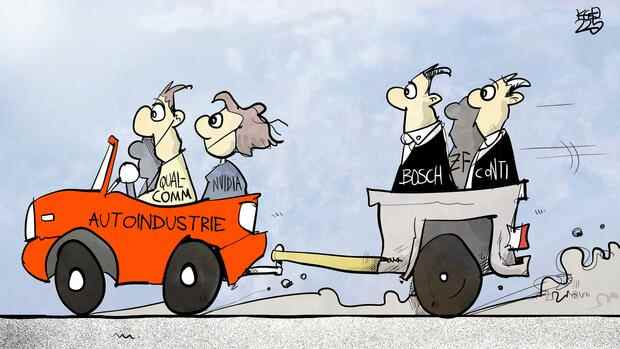The auto industry is becoming less profitable. Raw material costs rise and selling prices fall.
(Photo: Kostas Koufogiorgos)
The ritual is known. The big car manufacturers regularly ask their suppliers for a report on the same topic: prices have to go down. Such conversations can sometimes be chilly, and the lack of coffee and biscuits is sometimes considered a stylistic device in conducting negotiations. In the end, there is usually a compromise: the manufacturers promise more quantities, the suppliers lower prices. In a growth industry, that’s possible.
But that’s over. After the diesel crisis and the corona pandemic, the war in Ukraine is now finally throwing the industry out of step. While the numbers are falling, the prices for energy and raw materials are rising dramatically.
Production repeatedly comes to a standstill because critical parts such as semiconductors or cable harnesses are missing. It is a multiple stress situation in which the burdens are unequally distributed. Although suppliers account for more than half of the added value, this has long ceased to apply to profits.
While the VW group, with its noble subsidiaries Porsche and Audi, earns splendidly and BMW and Mercedes record profits, ZF and Bosch only have the thinnest margins, Conti has to drastically scale back its forecasts for the year. The situation is even more difficult for the downstream suppliers, the countless component manufacturers, metal processors and foundries – they hit delivery bottlenecks and inflation with full force.
Top jobs of the day
Find the best jobs now and
be notified by email.
As automakers take advantage of shortages and raise prices, costs remain stuck in the supply chain. Rigid contracts apply here, which only provide for the costs to be passed on to the car manufacturers in exceptional cases. Those who were hardly earning before are now being pushed to the wall by the record prices for gas, plastic and steel.
The car manufacturers are looking for new partners
The car manufacturers are aware of the development, but they see themselves exposed to other constraints. Volkswagen, BMW and Mercedes together are only worth half as much as Tesla on the stock exchange – they can only score with their investors with exceptionally high profits.
On the other hand, they know that some of their record returns are on shaky ground. The situation on the Chinese car market is darkening, and the downturn in China could soon tear ugly holes in the balance sheets.
The competition from the USA is overwhelming for German manufacturers.
(Photo: Reuters)
In addition, the biggest steps in the transformation are still to be taken. Diesel and petrol models still make up the majority of sales, but by 2025 at the latest, the electric drive will finally have the right of way. Then, with “Trinity” at Volkswagen and the “New Class” at BMW, the model ranges are to be given a new technical basis.
In addition to the electric drive, the new central computer and software will be the heart of the car. Today’s suppliers don’t have to be tomorrow’s: ZF, Bosch and Conti compete with Nvidia, Qualcomm and Waymo for the best places.
Software alone will not be enough in the future
Is this the moment to let your traditional suppliers down? Certainly not. Because the strength of car manufacturers will continue to depend on the functioning of their supply chains in the future. However, if the third and fourth tier suppliers come under too much pressure, the risk of quality problems and failures as a result of insolvencies increases.
This can have serious consequences: More than once, the assembly lines of car manufacturers stood still because seat covers, door handles or gearboxes were missing. Even a few days of downtime can ruin a quarter.
In their own interest, the car manufacturers should not exhaust their power too much. They should explain to their investors that in their own interest they are giving up a percentage point or two in favor of their suppliers. American software companies and Chinese battery manufacturers will not build the car of the future alone.
More: The Bronco disaster at Webasto: the car roof specialist is in the red
